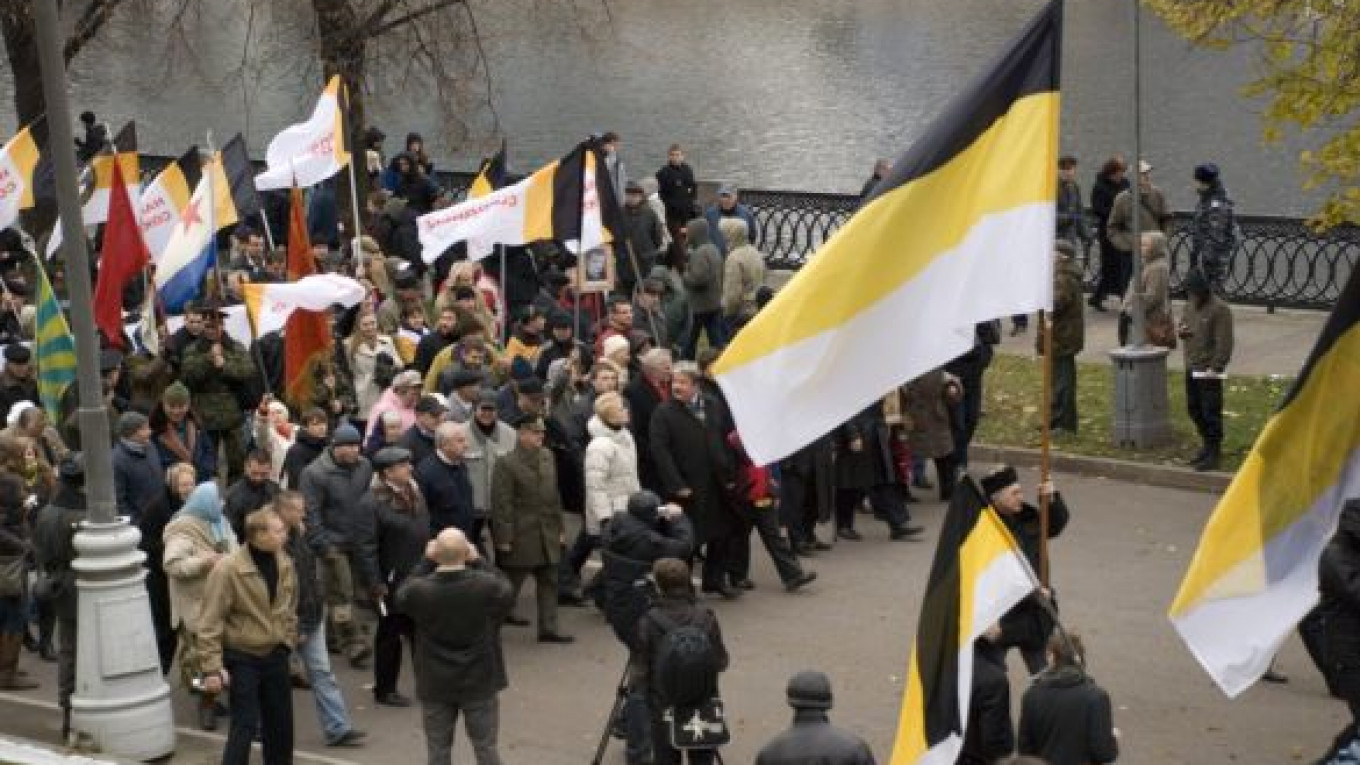The Moscow City Court opened hearings on Thursday into prosecutors' request to ban the country's leading ultranationalist group, but asked for more proof of its wrongdoing.
Prosecutors, who suspended the activities of the Movement Against Illegal Immigration last month, have accused it of extremism, but the group's founding father told The Moscow Times that the actual reason for the crackdown is political.
The Movement Against Illegal Immigration is being punished for attempting to register as a political party to run for the State Duma in December elections, Alexander Belov said by telephone Thursday.
Prosecutors cited Belov's proposal to deport Caucasus natives, voiced during ethnic riots in the Karelian town of Kondopoga in 2006, as an example of the group's extremist views, RIA-Novosti reported.
Belov also proposed the creation of the "people's militia," which prosecutors claimed amounted to an extremist call, during one of the annual Russian March rallies, the report said.
But defense lawyers said at Thursday's hearing that the organization cannot be held accountable for Belov's statements because he was no longer a member. They also said a case opened against him over his Kondopoga statements has since been closed.
Belov left the group in 2009 to spare it legal trouble after he was convicted of inciting ethnic hatred during a speech and handed a one-year suspended sentence.
The court on Thursday asked that more evidence of the group's extremist views be presented by April 5, RIA-Novosti reported, citing court officials.
The Movement Against Illegal Immigration, founded in 2002 but never officially registered, remains the country's sole prominent ultranationalist group.
In a burst of activity that might have contributed to the court case, several of its members participated in December rioting on Manezh Square, where 5,500 football fans and nationalists clashed with police during a rally over the killing of a Muscovite during a brawl with North Caucasus natives.
Belov said Thursday that the organization would switch to "other activity" if it were banned. He did not elaborate.
Alexei Mukhin, an analyst with the Center for Political Information, agreed that the court case was likely caused by the group's aspiration to become a political party.
He said a ban would only encourage disgruntled youth to join the group.
Leftist opposition leader Eduard Limonov said the group's popularity was growing, forcing the authorities to "play it safe."
"They are trying to act pre-emptively, using dull Stalinist-era methods, even though it is the voters who should decide," said Limonov, who also tried in vain to register a political party.
A registration request by his The Other Russia coalition was thrown out by the Justice Ministry in January.
A Message from The Moscow Times:
Dear readers,
We are facing unprecedented challenges. Russia's Prosecutor General's Office has designated The Moscow Times as an "undesirable" organization, criminalizing our work and putting our staff at risk of prosecution. This follows our earlier unjust labeling as a "foreign agent."
These actions are direct attempts to silence independent journalism in Russia. The authorities claim our work "discredits the decisions of the Russian leadership." We see things differently: we strive to provide accurate, unbiased reporting on Russia.
We, the journalists of The Moscow Times, refuse to be silenced. But to continue our work, we need your help.
Your support, no matter how small, makes a world of difference. If you can, please support us monthly starting from just $2. It's quick to set up, and every contribution makes a significant impact.
By supporting The Moscow Times, you're defending open, independent journalism in the face of repression. Thank you for standing with us.
Remind me later.






